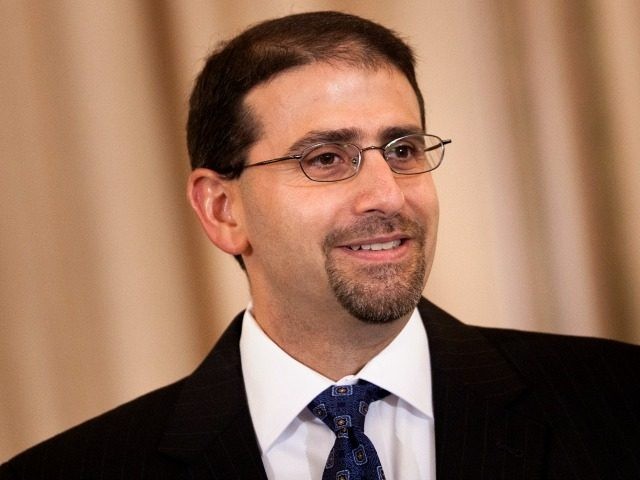Former U.S. ambassador to Israel Dan Shapiro (pictured) wrote that moving the U.S. embassy to Jerusalem can be undertaken even before Israel and the Palestinians reach a peace deal, reversing his position on the matter since the Obama administration left the White House.
Shapiro wrote an article in Foreign Policy in which he said such a move may also have positive influence on the day-to-day work of American diplomats posted in Israel.
Currently, American officials need to travel to Jerusalem to meet Israeli government officials, a trip that is short in miles but sometimes long in time due to traffic congestion.
“I supported all three presidents’ use of their national security waiver authority to delay the move in the interest of pursuing Middle East peace. But I have never believed that arguments for moving the embassy were groundless, or that it must await a final Israeli-Palestinian peace agreement,” Shapiro wrote.
“I’m influenced by my love of Jerusalem — an emotional attachment born of decades studying its history — and sense of justice for Jewish claims to the city that are far too often called into question. The presence of a US embassy in parts of Jerusalem no one disputes are Israeli territory is one way of acknowledging the centuries of history that link the Jewish people to the city, the questioning of which is closely linked to the denial of Israel’s very legitimacy.”
Shapiro, who is Jewish and speaks Hebrew well, will continue living in Israel until his children finish school.
In his article, he offered the administration of President Donald Trump some advice on how to go ahead with the move without infuriating the Arab world.
“Done carefully, it could advance American national goals and interests. Done carelessly, it could cause them grave harm and lead to preventable tragedy,” the former ambassador wrote.
During the campaign, Trump pledged that would move the embassy if he became president. After winning, he then appointed David Friedman as his ambassador to Israel. Friedman is a strong supporter of moving the embassy and the White House statement announcing his appointment expressed Friedman’s hope to serve in this role “from Israel’s eternal capital, Jerusalem.”
But since entering office, the White House has been hesitant.
Trump said the decision was not easy because the issue has “two sides.”
Shapiro praised the White House’s hesitancy on this issue, describing it as “a welcome contrast to numerous off-the-cuff policy pronouncements, from China to Mexico to refugee and immigration policy.”
Shapiro suggested that in order to enable a future peace deal based on a two-state solution, the US Embassy should be relocated to a part of western Jerusalem that will remain in Israeli hands in under any agreement.
Moving the embassy, he wrote, should not be confused with implying recognition of Israel’s claim to sovereignty over the whole city.
In addition, Shapiro wrote, the US needs to recommit itself to preserving the status quo of the holy sites to “assuage both Muslim sensitivities about the Haram al-Sharif (Temple Mount) and Jewish sensitivities about the Western Wall.”
The former ambassador wrote that such pronouncements may anger both the Israelis and the Palestinians, but could “actually advance the prospects for a two-state solution by shattering self-defeating myths on both sides.”
The Trump administration should consult with the Palestinians, the Jordanians, the Saudis and the Egyptians before making a decision, Shapiro said, adding that while Arab leaders are likely to protest the move and may even threaten “diplomatic retaliation,” they would also be careful not to lock horns with the Trump administration so early on.
Several Arab states also “have common strategic interests with Israel,” Shapiro wrote.
Shapiro said that announcing the move in advance to the Arab world may show them that the administration’s plan “shows respect” and could actually “dampen the blowback” against the decision.
According to the Times of Israel, in 1995, when the US Congress passed legislation on moving the embassy to Jerusalem, Shapiro worked as foreign policy aide to Democratic California Senator Dianne Feinstein, who was instrumental in getting the law’s sponsors to insert a provision allowing the president to waive the move. It is this particular stipulation that has prevented the embassy’s relocation for the last 22 years.
The waiver, last signed on December 1, 2016 by president Barack Obama, expires on June 1.

COMMENTS
Please let us know if you're having issues with commenting.